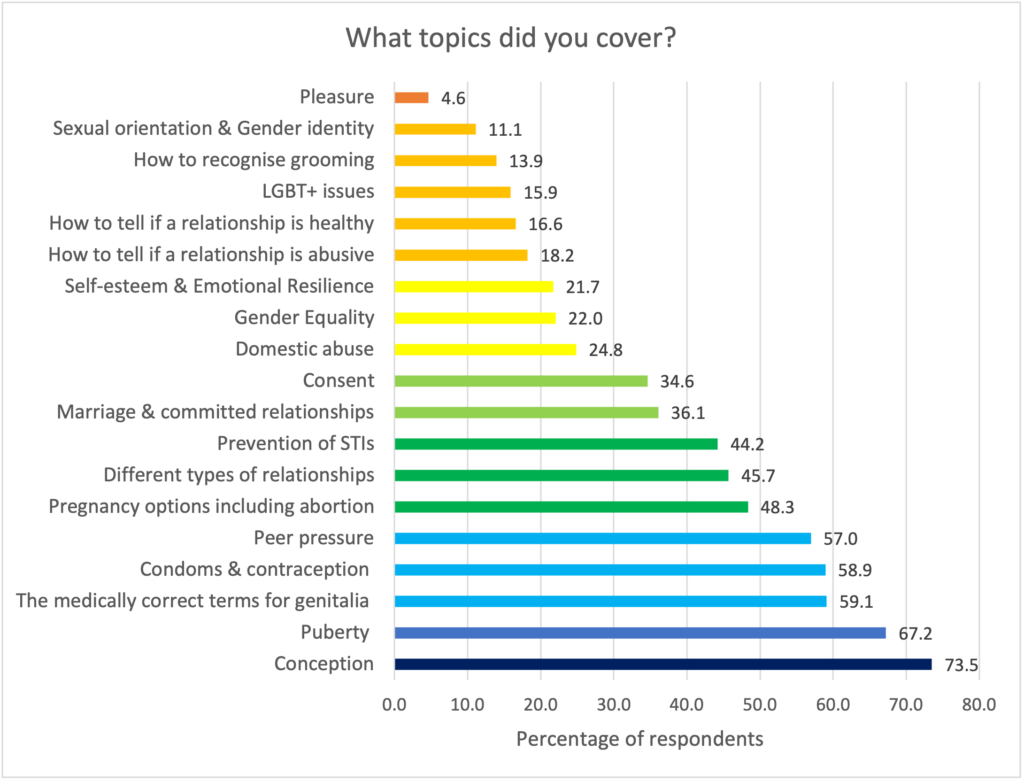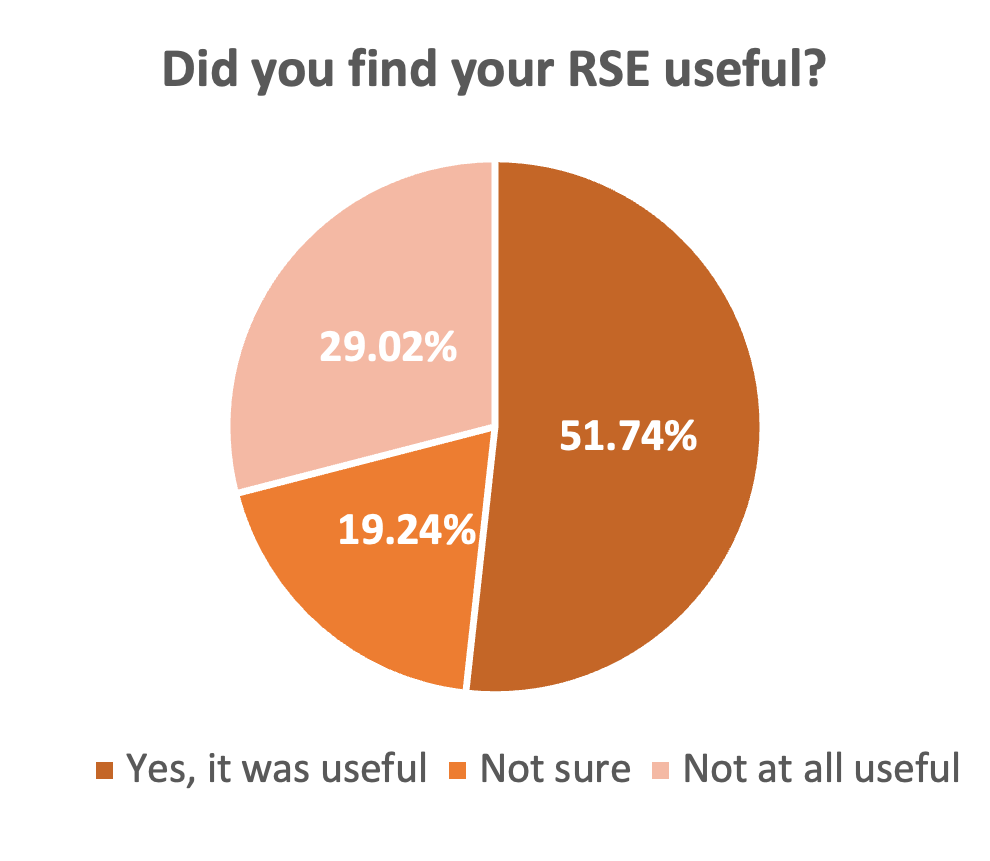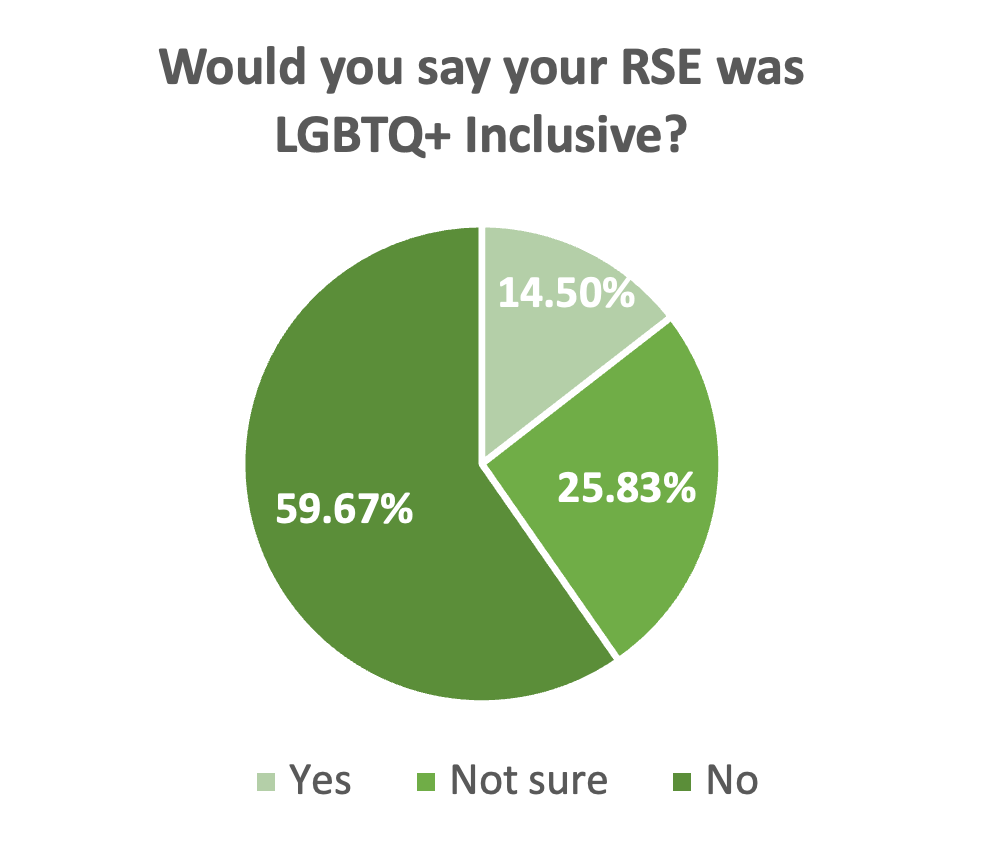Young people’s views on Relationships and Sexuality Education in Northern Ireland

Children and young people have the right to accurate, reliable information about their bodies, healthy relationships, sex and sexuality, and equality issues (UNCRC, 1989).
This learning provides the knowledge, skills, attitudes, and values to empower young people to foster safe and healthy relationships, make informed decisions, stay safe from harm, and lead authentic lives.
However, Relationships and Sexuality Education (RSE) remains a contentious and hotly debated topic. Some fear that talking and teaching about these issues will confuse children or encourage them to engage in sexual activity at a younger age.
There is little empirical evidence to support this concern and, in fact, considerable evidence that the reverse is true. Large international meta-analyses indicate that young people who receive comprehensive RSE engage in their first sexual experience later than those who receive no RSE or “abstinence-only” RSE and are less likely to take sexual health risks (Kirby, 2007; Montgomery & Knerr, 2018; Oringanje et al., 2009).
Furthermore, RSE has wider psycho-social benefits. Reviewing three decades of RSE research, Golfarb and Lieberman (2021) found that comprehensive RSE was associated with increased self-esteem and self-confidence, appreciation for diversity and equality, critical thinking skills to challenge stereotypes and misinformation, greater awareness on prevention of domestic abuse and child abuse and reduced homophobic and transphobic bullying in schools.
Relationships and Sexuality Education in Northern Ireland
In Northern Ireland, schools are required to have a written RSE policy but have flexibility in what they choose to teach, how it is taught, who teaches it and when it is delivered. This has led to concerns over “inconsistent and insufficient” RSE provision (Harte, 2022; Meredith, 2021), with potential unequal access to information depending on the type of school a pupil attends.
These fears are supported by recent reports from Northern Ireland Human Rights Commission (NIHRC) and Education and Training Inspectorate (ETI). Reviewing 124 post-primary schools’ RSE policies, NIHRC reported many schools use language which “shames and stigmatises” young people who have sex, contributes to victim-blaming narratives and, in some cases, promotes the belief that homosexual relationships are wrong (NIHRC, 2023). In their large-scale review of RSE across 509 primary, post-primary, special schools, and education centers in NI, the ETI identified “significant gaps” in RSE provision with many schools providing limited teaching on consent, gender and sexual identity, LGBTQ+ issues, domestic abuse and child sexual exploitation. The report noted schools demonstrated “selectivity and potential avoidance” of these crucial but sensitive areas (ETI, 2023).
These reviews suggest that many young people in NI are simply not getting the RSE they need and are legally entitled to (CEDAW, 1979; Equality Act 2006; UNCRC, 1989).
Guidance for schools is currently being reviewed and it is imperative for the voices of the young people this impacts to be part of this consultation and discussion.
In part one of this blog, I summarise the quantitative findings of my doctoral research exploring sixth formers’ views and perspectives of RSE in NI. Part 2 explores young people’s suggestions for RSE from the qualitative strand.
Method
An anonymous survey was developed and distributed online to all mainstream post-primary schools to cascade to their sixth-form students. At the end of the survey, students could express an interest in a follow up interview. The survey ran from February to August 2021.
A total of 604 students from 30 schools completed the survey (approximately 2% of school roll in 2020-21). 450 students left at least one detailed written comment in response to optional open-ended questions, and 8 young people participated in in-depth individual or friendship-paired interviews.
Findings
The content of RSE lessons
Students reported that RSE tends to be taught within science lessons, by their class teacher and using methods of discussion, worksheets and textbooks.
Participants were asked about what RSE topics they had covered in school, shown in the bar chart below. The most commonly covered topics related to science and managing risk:
- conception (73.51%)
- puberty (67.22%)
- medically correct names for genitalia (59.11%)
- contraception (58.94%)
- peer pressure (56.95%).
The least frequently covered RSE topics related to socio-emotional learning, identity and personal relationships:
- healthy relationships (16.56%)
- LGBTQ+ issues (15.89%)
- how to recognise grooming (13.91%)
- sexual orientation and gender identity (11.09%)
- pleasure (4.64%).
Awareness of services and available support was low amongst survey respondents. Only a third of participants reported knowing where to go if they wanted some information or advice related to RSE (33.39%). Just over one fifth indicated that there is someone in school they could ask for RSE advice (21.72%).
Around two thirds of students reported that they had never been asked about their views or opinions on RSE classes (64.68%).

Quality, usefulness and inclusivity
There were mixed views on the perceived quality and usefulness of RSE. Just over half felt that their RSE had been okay, good or very good (52.75%), with half of participants rating it as bad or very bad (47.25%). Similarly, just over half reported their RSE to be somewhat or very useful (51.74%).
Only one in seven participants reported that they felt their RSE had been inclusive of the LGBTQ+ community (14.50%), with over half of respondents noting that their RSE was not LGBTQ+ inclusive (59.67%).


Different experiences of RSE due to individual or school characteristics
Students who identified as LGBTQ+ rated their RSE as significantly less useful and of lower quality than their heterosexual peers.
Grammar school students reported covering significantly fewer topics and rated lower levels of quality and usefulness compared to their secondary school counterparts.
Students who attended schools with a Catholic ethos also reported covering significantly fewer topics than their peers attending non-Catholic background schools* and indicated lower levels of usefulness and quality of their school-based RSE.
These differences point to significant gaps and inconsistencies in RSE provision across NI schools and suggest some pupils are disadvantaged in not receiving the information they want, need, and are legally entitled to.
Suggestions
Participants were keen for RSE to include more relationship-based learning, to promote social-emotional development and understanding, as well as cover topics such as LGBTQ+ issues, consent and pleasure. Unsurprisingly, many of the least frequently covered topics appeared in their suggestions for what they would like more information on. Young people’s suggestions for how they would like RSE to be delivered will be explored further in Part 2 of this blog series.
Implications
The current findings add to the growing evidence base that there are significant gaps in RSE teaching and a lack of consistency of accurate, reliable information across schools in NI. Now is the time to raise standards of RSE delivery across the board through a standardised RSE curriculum, which adopts a rights-based, inclusive approach; is fully integrated and embedded throughout the whole curriculum and across the school environment; and seeks continued feedback and collaboration with pupils, parents and wider school community.
On 6 June, NI Secretary Mr Chris Heaton-Harris laid new regulations before parliament to update the minimum content of RSE in NI, in particular covering the topic of abortion. In practice this means that it will now be compulsory for post-primary schools to teach students about the legal right to an abortion in NI, how to prevent pregnancy and how to access relevant services. While this is a welcome step forward in meeting children’s rights in accessing this information, it also needs to coincide with significant guidance and practical support for schools to help build their capacity in delivering high-quality inclusive RSE.
We need to support teachers in building their confidence, knowledge, and skills in navigating these potential sensitive classroom discussions, explore our own values and opinions on “taboo” topics, and work to create safe, respectful, inclusive spaces for all our children to be able to participate and learn.
In short, we must be prepared to be a little bit more comfortable with our own discomfort. Recognising and acknowledging the big emotions these issues can bring up is the first step in reducing shame, stigma and student, teacher and parent anxieties around RSE. Failing to teach RSE in an inclusive, comprehensive manner means that we are failing to meet children’s needs and rights, and neglecting their developing social, emotional, physical health and wellbeing. In the words of one participant:
Let’s stop endangering young people by not teaching them about consent and toxic, abusive relationships and letting them get hurt because we feel awkward discussing these subjects
Year 13 Survey Participant
Ellen’s EP Reach-Out webinar on young People’s views and suggestions for RSE
* There are many different types of schools in Northern Ireland depending on management structure. This includes controlled schools (mainly Protestant), Catholic maintained schools, Integrated schools, Irish-Medium (education provided primarily in Irish), and Grammar schools (who use academic selection).
In the present study Catholic-maintained secondaries and Grammars under Catholic Management were categorised as schools with a Catholic ethos. “All other school types” refers to Controlled, Controlled Integrated, Grant Maintained Integrated, and interdenominational/nondenominational Grammar schools.
References
Belfast Youth Forum. (2019). Any use? Report. Young people’s opinions on Relationships and Sexuality Education (RSE) in Belfast.
Education and Training Inspectorate (ETI). (2023). The Preventative Curriculum in School and EOTAS Centres.
Equality Act (Sexual Orientation) Regulations (Northern Ireland) 2006,
Goldfarb, E. S. & Lieberman, L. D. (2021). Three Decades of Research: The Case for Comprehensive Sex Education. Journal of Adolescent Health, 68(1), P13-27. https://doi.org/10.1016/j.jadohealth.2020.07.036
Harte, L. (2022, January 26). Education Minister says ‘considerable work’ being done on sex education in NI schools. BelfastLive.
Kirby, D. B., Laris, B. A., & Rolleri, L. A. (2007). Sex and HIV education programs: their impact on sexual behaviors of young people throughout the world. Journal of Adolescent Health, 40, 206–217. https://doi.org/10.1016/j.jadohealth.2006.11.143
Meredith, R. (2021, March 13). Sex education in NI schools is insufficient, says expert panel. BBC News NI.
Montgomery, P., & Knerr, W. (2018). Review of the evidence on sexuality education: report to inform the update of the UNESCO International technical guidance on sexuality education. United Nations Educational, Scientific and Cultural Organization.
Northern Ireland Human Rights Commission (NIHRC). (2023). Relationships and Sexuality Education in Post Primary Schools in Northern Ireland: A Compelling Case for Reform
Oringanje, C., Meremikwu, M. M., Eko, H., Esu, E., Meremikwu, A., & Ehiri, J. E. (2009). Interventions for preventing unintended pregnancies among adolescents. Cochrane Database of Systematic Reviews, 7(4), CD005215. https://doi.org/10.1002/14651858.CD005215.pub3
United Nations Convention on the Rights of the Child, November 20, 1989
United Nations Convention on the Elimination of All Forms of Discrimination Against Women, December 18, 1979



